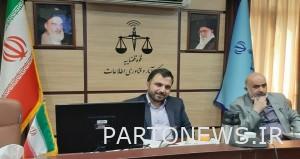Judiciary » Achieving a smart judiciary in line with the Islamic Revolution is one of the priorities of the judicial system

Head of Statistics and Information Technology Center of Judiciary:
According to the public relations report of the Center for Statistics and Information Technology of the Judiciary, the head of the Center for Statistics and Information Technology of the Judiciary in a meeting with the Deputy Statistics and Information Technology of Justice of all the provinces of the country, which was held in the form of a video conference, while offering condolences on the anniversary of the martyrdom of Imam Sajjad, peace be upon him. Acknowledging the large family of information technology of the Judiciary, he said: Achieving a smart Judiciary at the level of the Islamic Revolution is one of the central strategies of the Judiciary, which is emphasized by the Head of the Judiciary.
Dr. Zarepour pointed out that the actions taken during this period have been satisfied by the honorable head of the judiciary, that this satisfaction gives us encouragement and support to continue our work, and their support is an asset, and they have asked us to work jihadily. God willing, they will also support Jihadi.
The head of the Statistics and Information Technology Center of the Judiciary, emphasizing the necessity of technology development in the Judiciary, said: “Technology can transform the Judiciary, work round the clock and diligently so that our actions can solve the problems of the people in the current economic and social conditions. solve and make people satisfied with the Islamic system; God willing, it will also be pleasing to God.
Dr. Zarepour further pointed to the new structure of the center and said that thanks to the grace of God and with the follow-ups and the support of the Judiciary, the technological structure of the Judiciary has been strengthened, and in the new structure that has been announced, the center has three vice-chairs and three departments. The entire stand-alone is upgraded.
He continued: We have made the structure of the center more specialized and the information technology department has been divided into two departments for systems and judicial intelligence and the department for infrastructure and technology equipment.
The Deputy of Judicial Electronic Services is the third deputy, which is actually a development of the General Office of Electronic Services. Under the Deputy of Judicial Electronic Services, the management of electronic judicial services offices has been defined with the same user as before, along with the management of automation and user affairs and the department of organizational interactions.
The head of the Statistics and Information Technology Center of the Judiciary further added that, considering that many electronic services that are performed and placed on the network, require training and support of users, the task of managing automation and user affairs is that, first of all, services which have the ability to be automated, to count and plan and to make it electronic in interaction with the systems affairs, and the issue of training and support is also the responsibility of this management, so that by setting up call centers, they can do the work that Next week, the round-the-clock support center will be launched for several categories of users.
Dr. Zarepour also pointed out in the discussion of organizational interactions: We have identified about 250 to 300 types of inquiries that we should move towards making them electronic. By-laws, Clause “T” of Article 117 of the Law of the Sixth Plan, which obliges all institutions to respond to the inquiries of the judiciary in electronic form, was approved by the government board with the follow-ups that took place two weeks ago, so that all the services we need through platforms Receive electronic communication online or electronically from the relevant device.
He continued: “We launch a new inquiry almost every week, and this requires the cooperation of friends at the center who follow the mechanism and training seriously, as well as the assistants and technology managers in the provinces who train respected administrative colleagues. and pursue legal action. In this context, Dr. Zarepour expressed his hope that we will see a day when all inquiries will be followed electronically. He also pointed to some examples of work in progress and said that the issue of communication with Naja and the government network is being followed in a special and serious manner. He also pointed out some of the ongoing measures, such as the organization of judicial service offices, the development of bylaws for electronic proceedings, and the plan to modernize the judiciary’s technological equipment.
In the final part of this meeting, the deputy heads of statistics and information technology of Khorasan, Razavi, Isfahan, Central, Kurdistan, Golestan, Kermanshah, North Khorasan, Semnan, West Azerbaijan, Chaharmahal and Bakhtiari, Ilam, Tehran and Zanjan offered suggestions, criticisms and existing problems. discussed with the head of the center and his deputies.

